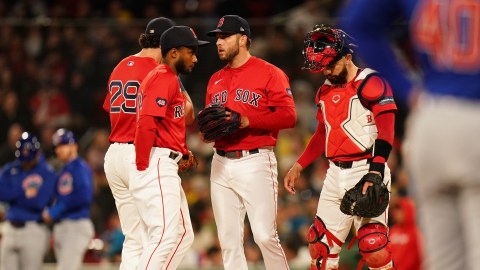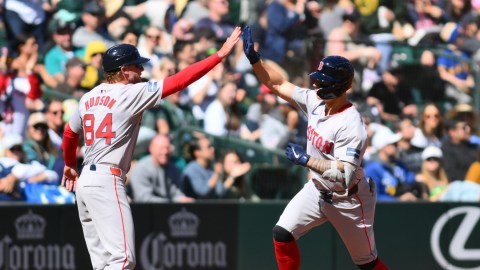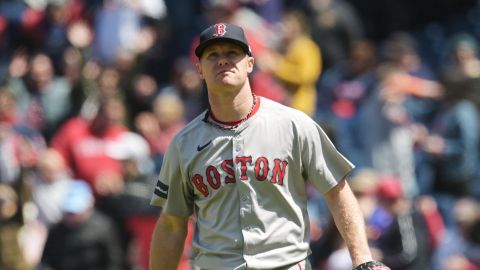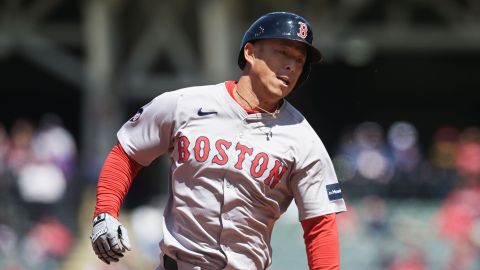This isn’t a carnival. While radar gun readings can create buzz, they’re hardly the be-all and end-all in Major League Baseball. In fact, some hard-throwers flat-out stink.
Yet there’s still something to be said for having power pitchers, especially in the bullpen, where high-strikeout hurlers can shorten games through late-inning dominance, now more than ever.
The Boston Red Sox have been slow to evolve in that regard, much to their detriment over the last couple of seasons.
“Baseball’s trending that way, baseball’s moving in that direction, where you’re seeing guys who are pumping mid-90s out of the bullpen and it’s working,” Red Sox bench coach Torey Lovullo, who served as Boston’s interim manager down the stretch, said last week in Cleveland. “It’s a situation where sometimes you don’t want to get into the bullpen, and we’ve talked about this as a group.
“You don’t necessarily want to drive up the pitch count on the starting pitcher, because that might be the guy you’re going to score four or five runs off of before the fifth inning ends. We like the power arms, we like the idea of the power arms and we’ll see what’s out there this year.”
The Red Sox’s offensive philosophy clearly has changed since the club won the World Series in 2013. That season, Boston’s coaching staff, especially manager John Farrell, constantly preached the importance of driving up a starting pitcher’s pitch count in the hopes of getting into the opponent’s bullpen early and doing damage off its relievers. The game plan worked more often than not.
But this isn’t 2013. Some teams have begun to equip their bullpens with power arms, each of whom is capable of pinning down the opposition for three outs at a time. It worked for the 2014 Kansas City Royals, who came within one win of a World Series title, and it’s been working for other squads who, by virtue of their loaded ‘pens, no longer need their starters to go seven or eight innings on a given night.
“This year we had a lot of issues with the pitching,” David Ortiz said last week. “I think we need more power pitching. If you have no power pitching, you’re not going to make it. Pitching is pretty much everything in this game right now. You can win with offense, but if you have the type of pitching that can hold (down) offenses from the opposition, it gives you a lot of good opportunities to score a couple of runs and win ballgames.
“That’s what everybody is going for right now: good power pitching.”
Of course, it helps to have power pitching in the rotation, too, and Boston’s pursuit of an ace could coincide with its quest to add such hurlers. But velocity — more accurately, the ability to overpower an opponent — tends to play up late in games, and the Red Sox simply don’t have the horses in that area.
It hurt the Red Sox in a division led by the Toronto Blue Jays, who boast a world-beating offense, and the New York Yankees, whose late-game combination of closer Andrew Miller and setup man Dellin Betances played a pivotal role in the team’s success.
“Power (arms) used to be 95 (mph). Now, when you see power, you’re seeing guys that are throwing 97, 98, 99,” Red Sox president of baseball operations Dave Dombrowski recently told the Boston Herald. “And then there’s the ability to use a secondary pitch or so. You come out of New York and see the power that, let’s say Miller has, or that Betances has, but they also have a secondary pitch that’s good. I think all people would love to have power, but there’s also more elements than just throwing hard.”
There are outliers, sure. Red Sox closer Koji Uehara, for instance, can be one of the most dominant pitchers on the planet when all is right despite consistently sitting below 90 mph with his fastball.
But Boston’s bullpen hardly evokes fear in opponents. And much of that stems from the unit’s lack of pitchers who are capable of entering a game, reaching back and punching out a hitter in a key spot.
Thumbnail photo via Brad Penner/USA TODAY Sports Images




